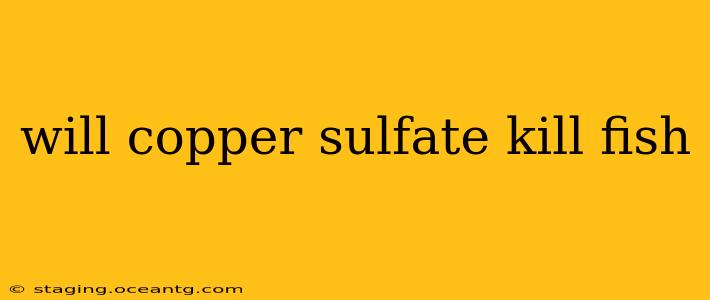Copper sulfate, a bright blue crystalline compound, finds use in various applications, from agriculture to industry. However, its impact on aquatic life, particularly fish, is a serious concern. The short answer is yes, copper sulfate can kill fish, and even low concentrations can be harmful. This article will delve into the specifics, exploring the toxicity levels, potential impacts, and precautions to take.
How Does Copper Sulfate Affect Fish?
Copper sulfate's toxicity to fish stems from its interference with vital bodily functions. The copper ions in the compound disrupt gill function, leading to reduced oxygen uptake. This ultimately results in suffocation and death. Furthermore, copper ions can bind to proteins and enzymes, impairing various metabolic processes within the fish's body. The severity of the effects depends on several factors, including the concentration of copper sulfate, the species of fish, water temperature, and water hardness.
What Concentration of Copper Sulfate Kills Fish?
There isn't a single, universally applicable concentration of copper sulfate that guarantees fish mortality. The lethal dose varies significantly depending on the factors mentioned above. However, even relatively low concentrations can cause stress, gill damage, and reduced growth in fish. It's crucial to understand that any introduction of copper sulfate into a water body inhabited by fish poses a risk. The safe level is effectively zero, particularly in environments supporting sensitive aquatic ecosystems.
What are the Symptoms of Copper Sulfate Poisoning in Fish?
Fish exhibiting copper sulfate poisoning may display several symptoms, including:
- Lethargy and inactivity: Fish may appear listless and unresponsive to their surroundings.
- Gill damage: Observe the gills for discoloration, excessive mucus production, or visible lesions.
- Increased respiration rate: Fish may struggle to breathe, gasping at the surface.
- Loss of coordination: Fish may swim erratically or have difficulty maintaining balance.
- Changes in coloration: Fish may exhibit unusual darkening or fading of their skin.
- Death: Ultimately, exposure to toxic levels can lead to death.
What Happens if Copper Sulfate Gets into My Pond?
Accidental introduction of copper sulfate into a pond can have devastating consequences for the entire aquatic ecosystem. The death of fish is only one aspect; other organisms, including invertebrates and plants, are also susceptible to its toxicity. Immediate action is necessary to mitigate the damage. If you suspect contamination, contacting a local environmental agency or aquatic specialist is crucial. They can advise on appropriate remediation strategies, which may involve water testing, aeration, and potentially other treatment methods.
Is Copper Sulfate Used in Aquaculture?
While copper sulfate has some applications in aquaculture for treating specific diseases under very controlled conditions, it's highly discouraged for use by individuals lacking extensive expertise and equipment. Improper use can easily lead to mass fish mortality and contaminate the water source. Professional aquaculture operations often have strict guidelines and monitoring systems in place to minimize risks associated with copper sulfate and other chemicals.
How Can I Prevent Copper Sulfate from Harming Fish?
The best way to prevent copper sulfate from harming fish is to avoid its use near any water body containing aquatic life. If you must handle copper sulfate, do so with extreme caution and follow all safety guidelines provided on the product label. Proper storage and disposal are essential to prevent accidental contamination.
Conclusion: Handle with Extreme Caution
Copper sulfate's potential for harming fish is undeniable. While it has legitimate uses in certain contexts, its handling requires utmost caution to prevent environmental damage and protect aquatic life. Prioritizing safer alternatives and practicing responsible disposal is paramount to maintain healthy aquatic ecosystems.
